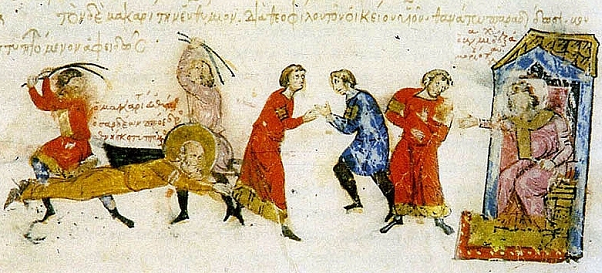Mosul Museum: first the bad news, perhaps
[ by Charles Cameron — there’s some question as to the authenticity of the footage of destruction in the Mosul Museum, hence the triple post of which this is part 1 ]
.
First the grief, the terrible wailings:
#Iraq #Mosul #IS (Via @stevoiraq) pic.twitter.com/YLHzsPgKbq
— Ahmed Shames (@AhmedUK_IQ) February 27, 2015
The reason for the grief:
"The Mosul museum is a major museum. It has a remarkable collection of finds that date back to the Neolithic era." http://t.co/PIArDCKNKv
— Democracy Now! (@democracynow) February 27, 2015
I have to say, I too was moved to tears by the video.
The symbolic impact:
— steven nabil (@stevoiraq) February 27, 2015
An individual’s response ties the destruction of statuary in with the destruction of lives:
And one more thing against Cultural terrorism of #ISIS. Je Suis #MosulMuseum #Iraq pic.twitter.com/um7U6komWA
— Joyce Karam (@Joyce_Karam) February 28, 2015
A communal response as reported by the same individual:
Baghdad responds: #Iraq National Museum Re-Opens days after #ISIS thuggery in Mosul's.US invasion 2003 forced closure pic.twitter.com/fWg07rI98p
— Joyce Karam (@Joyce_Karam) February 28, 2015
**
Two useful articles:
Following up on those videos of ISIS smashing Assyrian antiquities in the Mosul Museum, here’s a roundup of commentary and detail from several websites around the preservationist community. And let me emphasize that I am not giving more weight to the destruction of antiquities than to the slaughter of human beings, but that barbarity is already well known.
But another way to think about it is as squarely in a tradition of iconoclasm. Abraham, the patriarch of Judaism, Christianity, and Islam, himself destroyed idols, according to tradition. There’s a strong tradition of icon-destruction in Christianity. And in pre-Islamic Mecca, the Kaaba was the site of multiple idols, which Muhammad cleared out before rededicating the site to God. This is certainly the tradition to which ISIS wishes to claim a connection. The Taliban, another group that claimed fidelity to the principles of early Islam, also spent a great deal of time destroying images of people—most notably the massive Buddhas at Bamiyan in Afghanistan. The tomb of Muhammad in Mecca was itself destroyed by Ibn Saud, the first monarch of Saudi Arabia, early in the 20th century.
The fog of war makes it tough to tell when genuine artifacts are missing or in danger.
In reality, the relationship with icons in all three Abrahamic religions is rather more elaborate than Abu Bakr al-Baghdadi would want us to believe—but the tradition is there. Destroying traces of forebears, and even robbing and destroying tombs, has perhaps a longer tradition in civilization than preservation.ISIS can’t claim total purity on the matter itself, either. The group has widely been reported to be profiting by selling plundered artifacts on the black market.
**
And let’s not forget the Christian tradition of iconoclasm, both Orthodox and Protestant, either:




February 28th, 2015 at 10:07 pm
Christian iconoclasm occurring centuries ago is irrelevant. No reason to forget it. No reason to remember it either.
.
The destruction of the Musul Museum and of the Bamiyan Buddhas shows that this type of destructive vandalism is alive and well among some Muslims, who armed and have the means an will to cause a lot of havoc and destroy irreplaceable things that belong to all of humanity.
.
The idea of being even-handed by citing events from centuries ago lends no clarity at all to the current conflict. Why do Christians of today have to apologize for events which occurred centuries ago when these savages commit crimes today which they would never dream of committing.
.
This is not complicated. Christianity NO LONGER engages in iconoclasm or murdering unbelievers or engaging in bloody intramural conflicts over differing theology. Literally centuries have elapsed since those things occurred except in isolated pockets. The Pope is not issuing fatwas, or calls for a new crusade. The Methodists are not calling for the destruction of mosques and the Unitarians are not burning Korans or crucifying Muslims. The Missouri Synod Baptists are not beheading Muslim children and laughing and jeering as they toss the bloody severed heads to their screaming, weeping parents.
.
Islam, today, now, has many millions of people who support these actions, including nations and groups with billions of dollars to promote them and hundreds of thousands of young men eager to engage in them, even, and sometimes enthusiastically, at the cost of their own lives.
.
One set of facts is historical. One is contemporary.
.
One set of facts is relevant to the current conflict. One is at best a distraction.
February 28th, 2015 at 10:32 pm
Hi, Lex:
They don’t — nowhere have I asked anyone to blame them, nor them to apologize. These ideas are utterly foreign to me.
.
We read in your comment on another of my posts:
It may be the easier task, but as someone I rea recently put it, defeating IS / Daesh militarily is a very different thing from defeating the apocalyptic ideology that drives both IS and others — if I run across the quote, I’ll bring it here. How to use that understanding? Not in debate, I think. But that’s another discussion, and one that with any luck I’ll arrive at in due course. Understanding their motivations is, I will argue, very useful — and knowing that one’s own culture has at times held similar positions may be one way to facilitate that understanding.